陕西省宁强县天津高级中学高中英语 Module1 British and American English period 2 C级学案(教师版) 外
- 格式:doc
- 大小:140.00 KB
- 文档页数:6
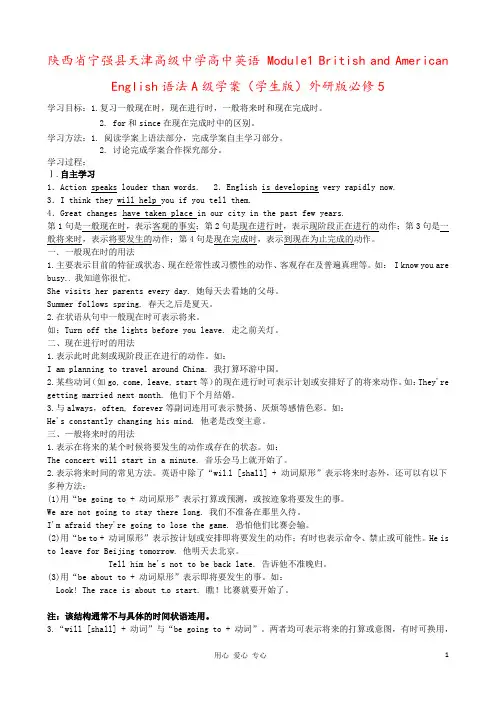
陕西省宁强县天津高级中学高中英语 Module1 British and American English语法A级学案(学生版)外研版必修5学习目标:1.复习一般现在时,现在进行时,一般将来时和现在完成时。
2. for和since在现在完成时中的区别。
学习方法:1. 阅读学案上语法部分,完成学案自主学习部分。
2. 讨论完成学案合作探究部分。
学习过程:Ⅰ.自主学习1.Action speaks louder than words. 2.English is developing very rapidly now.3.I think they will help you if you tell them.4.Great changes have taken place in our city in the past few years.第1句是一般现在时,表示客观的事实;第2句是现在进行时,表示现阶段正在进行的动作;第3句是一般将来时,表示将要发生的动作;第4句是现在完成时,表示到现在为止完成的动作。
一.一般现在时的用法1.主要表示目前的特征或状态、现在经常性或习惯性的动作、客观存在及普遍真理等。
如: I know you are busy.我知道你很忙。
She visits her parents every day. 她每天去看她的父母。
Summer follows spring. 春天之后是夏天。
2.在状语从句中一般现在时可表示将来。
如:Turn off the lights before you leave. 走之前关灯。
二、现在进行时的用法1.表示此时此刻或现阶段正在进行的动作。
如:I am planning to travel around China. 我打算环游中国。
2.某些动词(如go, come, leave, start等)的现在进行时可表示计划或安排好了的将来动作。
如:They're getting married next month. 他们下个月结婚。
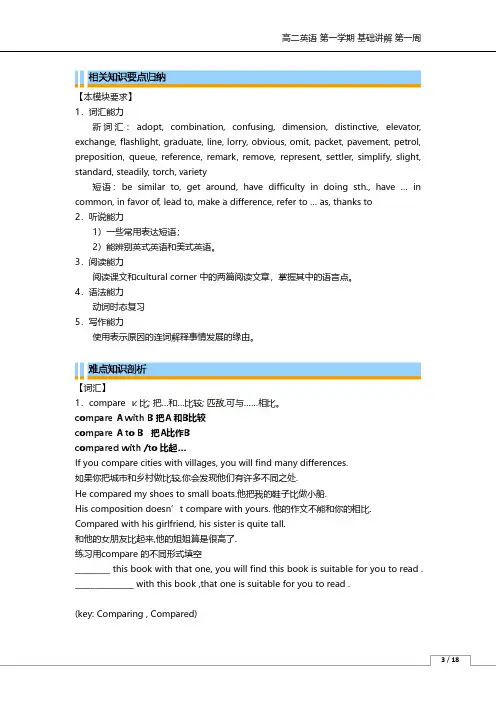
【本模块要求】1.词汇能力新词汇:adopt, combination, confusing, dimension, distinctive, elevator, exchange, flashlight, graduate, line, lorry, obvious, omit, packet, pavement, petrol, preposition, queue, reference, remark, remove, represent, settler, simplify, slight, standard, steadily, torch, variety短语:be similar to, get around, have difficulty in doing sth., have … in common, in favor of, lead to, make a difference, refer to … as, thanks to2.听说能力1)一些常用表达短语;2)能辨别英式英语和美式英语。
3.阅读能力阅读课文和cultural corner 中的两篇阅读文章,掌握其中的语言点。
4.语法能力动词时态复习5.写作能力使用表示原因的连词解释事情发展的缘由。
【词汇】1.compare v. 比; 把…和…比较; 匹敌,可与……相比。
compare A with B 把A 和B比较compare A to B 把A比作Bcompared with /to 比起…If you compare cities with villages, you will find many differences.如果你把城市和乡村做比较,你会发现他们有许多不同之处.He compared my shoes to small boats.他把我的鞋子比做小船.His composition doesn’t compare with yours. 他的作文不能和你的相比. Compared with his girlfriend, his sister is quite tall.和他的女朋友比起来,他的姐姐算是很高了.练习用compare 的不同形式填空_________ this book with that one, you will find this book is suitable for you to read . _______________ with this book ,that one is suitable for you to read .(key: Comparing , Compared)2.exchange vt./ n.交换, 调换, 兑换, 交流, 交易He gave me an apple in exchange for a cake. 他给我一个苹果,换一块蛋糕。

Module 1 British and American English Period OneStep 1. Lead-in1. Do you like travelling?Have you ever been to the other countries?What do you know about Britain\American?(Ask students to speak out as many as they can)2. What’s the difference betwe en the UK and the USA?(The teacher can show the Ss some picture.)(Ask the Ss to write down the differences and check with their partner)Step 2. Warming-up (Introduction)Read two English letters and decide which is written by an American.Comprehend quotations about the differences.Step 3. Fast reading1. Help students to grasp the main idea of the text by doing the task.2. Read the titles and the first sentences of each paragraph and find four ways in which British and American English are different.Step 4. Reading for detailed informationRead para.1 and fill in the form.(The form is on the next page)Do some true or false questions and check some detailed information(1)There’re a lot of difference in grammar between British and American English.(2) Spelling is the first and most obvious difference between the two.(3) British people say ”write me” and ”on the team”.(4 There’s not much variation in language within the country.(5) Television and Internet have made it easier for the British and Americans to understand each other.(6) In the future, there’ll be only one kind of English.3. Beautiful sentences: to learn some important structuresStep 5. Practisefill in the blanks with some key wordsThere’re four ways in which British and American En glish ________ from each other. The first and most ________ way is in the vocabulary. In grammar there’re a few __________. The British say Have you got…? ______Americans prefer Do you have…? The British use prepositions ______ Americans sometimes ______them. The other two areas in which the two _________ are different are spelling and pronunciation. But for more than a century communications have developed _______.Thanks to satellite TV and the Internet, it has been possible to listen to many Englishmen at the ______ of a switch. So experts believe that the two are moving ______.3. Retell the text according to it.4. DiscussionWhich of the following do you think is the best language in the future? Why?British English, American English, world English, ChineseStep 6. VocabularyTask: Rewrite the sentences using the British words.1. Match the British and American words and phases in the box..2. Ask the students to read their answers out and compare with their partners.3. Rewrite the sentences using British words. .4. Summarize: and Practice:Step 7. Open workTry to find information about Chinese and prepare a report to introduce the following three aspects of Chinese.The writing systemVarieties of Chinese3. Language todayPeriod TwoStep 1. Grammar 1Task 1: Find out the uses of the verbs. Rules of the tenses.Activity 1. Match the sentences with the correct meanings.Activity2. complete the sentences with the correct form of the verbs.Activity3. Tell the uses of the verbs. Rules of the tenses(1)Complete the sentences in your own words.(2)Observe, compare and find out the rules.【NMET.2001】:I ____ ping-pang quite well, but I haven’t had time to play since the new year .A. will playB. have playedC. playedD. play【北京春招2000】:—You’re drinking too much.—Only at home. No one ________ me but you.is seeing B. had seen C. sees D. saw2. Can you explain the following use of tenses.present simple tensepresent continuous tensepresent perfect tensefuture tenseStep 2. FunctionTask: Giving reasonsDirections:1. Underline the words which introduce reasons.2. Answer the questions.3. Complete the sentences with because\since\as or now that.Step 3. TestComplete the messages with the correct form of the verbs.Hi Mum,Hope you__________(be) well. I ________(have) a lovely time in New York. Tomorrow we___________ (go) to see the fireworks. It’s hard to understand the accent here, but it ________(get) easier ,as I _________(be) here for 3 weeks. Next week we _________(fly) to Mexico where they ________(speak) no English at all, just Spanish. I __________(Spend) nearly all the money you gave me!Love , Xiao PingPractice : Make your own sentences creatively, using because, since, as or now that.Step 4. Everyday EnglishTask: Use the phrases freely.1. Remind the students of the expressions that we have learned.2. Ask the students to remember them .3. Speaking practice:Have a conversation using some of the phrases.Step 5. HomeworkHave a good revision of today’s lesson and make sentenc es with the tenses and various words to express reasons. It’s better to do some related exercises.Period ThreeStep1. Warming up: Talk about the problems exchange students have.understanding the languagegetting on with peoplefooddifferent school subjects and timetablelocal customsclimateStep 2. PresentationListen to the target language:Vocabulary and Listening –2.Listening to the 1st part(5m) Listen and complete the passage.Hello, and welcome to today’s edition of In the air. As you know, every week on this programme we discuss an aspect of the way we _ _1____ now, and today’s topic is the language we ____2____-English. So that’s something which affects us all. The question is,what’s going to _ _3 ___ to the way we speak English in the future? Are we all going to speak like Americans? Or will British English continue to _ 4___? Later on we’re going to _ 5___ you to phone in and _ _6___ your views on the subject, but first we’re going to _ _7___ to two young people, one American, and one British, who have spent time on an educational exchange in the other’s country. We _ _8___ they will have some interesting ideas on the subject.Play again to answer the quesrions. Make notes if necessary .( Activity 4)Have the students compare the answer in pairs.Play the tape a third time for a final check.Check notes with the teacher.Step 3. Speaking and Writing1. Review the content of the text by asking some questions.In how many ways are American English and British English different?Which is the first and most obvious way?......2. The great debateWork in groups. Read the notes and decide which is the best variety of language in the future. Give your reasons.British English, American English, World English & Chinese3. WritingWrite a passage about your favourite choice and the reasons in the discussion above or write three more paragraghs about the Chinese language(activity 4 on P8).Step 4. HomeworkGet more information about the language through the Internet or other method to support your composition.Period FourStep 1. Cultural corner1. Read the text quickly and match each paragragh with the correct main idea.2. Appreciate and analyze 2 or 3 long sentences.Step 2. Module File1. Review: Go over the vocabulary and grammar focus in the module file.2. Put“?” next to the things you are not sure of .Then solve the problems in groups or raise your questions.3. Do some exercises to consolidate what we learned in this module.Step 3. HomeworkRecite the phrases and sentence patterns .Period 3: Grammar—Review of verb forms (1)Goals●To review Present simple, present continuous, present perfect and future reference; for and since with present perfectProcedures▇Reviewing Present simple, present continuous, present perfectUsing the Present Perfect Tense: FOR or SINCE?We use Present Perfect tense to talk about action which started in the past and continues up to the present.ExamplesI have had this computer for about a year.How long have you been at this school?I haven't seen Julia since September.Tip! For other uses of the Present Perfect tense, see the Present Perfect Tense - When To Use. We use for with a period of time, for example: a few days, half an hour, two years. We use since with the time when the action started, for example: last year, June 8, I met you.Each of these present perfect sentences contains a time expression. Each time expression is a length of time (which requires FOR) or a starting time (which requires SINCE).1 Maya has been a professional ________ 1989.2 So far, it has rained ________ five hours.3 I haven't been snowboarding ________ last winter.4 Jo has been a student here ________ March.5 The beaver has been an emblem of Canada ________ many years.6 Cougars have almost disappeared from the Victoria area ________ humans settled here.7 Mary has kept a diary ________ she was ten years old.8 First Nations people in British Columbia have told stories about the eagle ________ hundreds of years.9 The Canadian two-dollar coin (or toonie) has been in circulation ________ 1996.10 They've been married ________ twenty-five years.11 I haven't phoned home______ Christmas.12 We've been here__________ nine o'clock.13 I have worked for International House__________ more than eight years.14 I haven't visited my home town_________ I left school.15 I haven't been to the cinema__________ ages.16 I have studied non-stop_________ 9.15.17 I have had a driving licence_________I was eighteen.18 She hasn't had a day off _________1999.19 Johan has been in England__________more than two weeks now.20 Peter has been my best friend_________ we were nine.■Closing down by deciding if you need for or since with these time expressions.---for/since last weekend---for/since ten seconds---for/since Christmas Eve---for/since a decade---for/since I finished school---for/since a couple of days---for/since my birthday---for/since a long time---for/since ten centuries---for/since the 70s---for/since I was a boy---for/since August---for/since the last month---for/since fifteen years---for/since ten seconds---for/since Christmas Eve---for/since a decade---for/since I finished school---for/since a couple of days---for/since my birthday---for/since a long time---for/since ten centuries---for/since the 70s---for/since I was a boy---for/since August---for/since the last month---for/since fifteen years---for/since the accident---for/since then---for/since we bought this house ---for/since last month---for/since a millennium---for/since I met you。
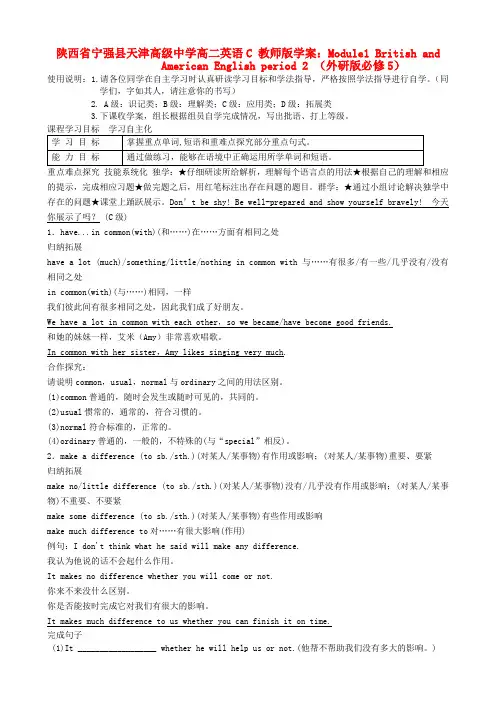
陕西省宁强县天津高级中学高二英语C 教师版学案:Module1 British andAmerican English period 2 (外研版必修5)使用说明:1.请各位同学在自主学习时认真研读学习目标和学法指导,严格按照学法指导进行自学。
(同学们,字如其人,请注意你的书写)2. A级:识记类;B级:理解类;C级:应用类;D级:拓展类3.下课收学案,组长根据组员自学完成情况,写出批语、打上等级。
重点难点探究技能系统化独学:★仔细研读所给解析,理解每个语言点的用法★根据自己的理解和相应的提示,完成相应习题★做完题之后,用红笔标注出存在问题的题目。
群学:★通过小组讨论解决独学中存在的问题★课堂上踊跃展示。
Don’t be shy! Be well-prepared and show yourself bravely! 今天你展示了吗? (C级)1.have...in common(with)(和……)在……方面有相同之处归纳拓展have a lot (much)/something/little/nothing in common with 与……有很多/有一些/几乎没有/没有相同之处in common(with)(与……)相同,一样我们彼此间有很多相同之处,因此我们成了好朋友。
We have a lot in common with each other,so we became/have become good friends.和她的妹妹一样,艾米(Amy)非常喜欢唱歌。
In common with her sister,Amy likes singing very much.合作探究:请说明common,usual,normal与ordinary之间的用法区别。
(1)common普通的,随时会发生或随时可见的,共同的。
(2)usual惯常的,通常的,符合习惯的。
(3)normal符合标准的,正常的。

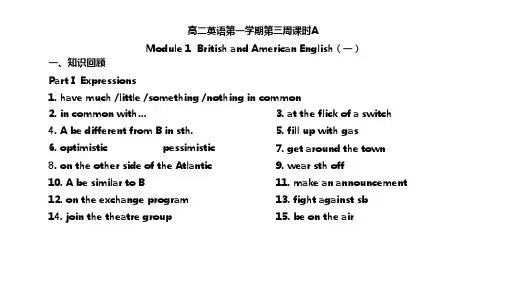
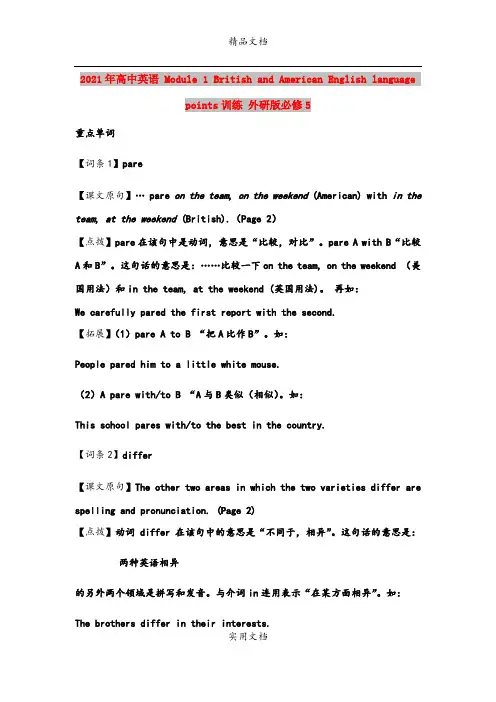
2021年高中英语 Module 1 British and American English languagepoints训练外研版必修5重点单词【词条1】pare【课文原句】… pare on the team, on the weekend (American) with in the team, at the weekend (British).(Page 2)【点拨】pare在该句中是动词,意思是“比较,对比”。
pare A with B“比较A和B”。
这句话的意思是:……比较一下on the team, on the weekend (美国用法)和in the team, at the weekend (英国用法)。
再如:We carefully pared the first report with the second.【拓展】(1)pare A to B “把A比作B”。
如:People pared him to a little white mouse.(2)A pare with/to B “A与B类似(相似)。
如:This school pares with/to the best in the country.【词条2】differ【课文原句】The other two areas in which the two varieties differ are spelling and pronunciation. (Page 2)【点拨】动词differ在该句中的意思是“不同于,相异”。
这句话的意思是:两种英语相异的另外两个领域是拼写和发音。
与介词in连用表示“在某方面相异”。
如:The brothers differ in their interests.【拓展】⑴短语A and B differ from each other / A differs from B意思是“A和B有区别”。
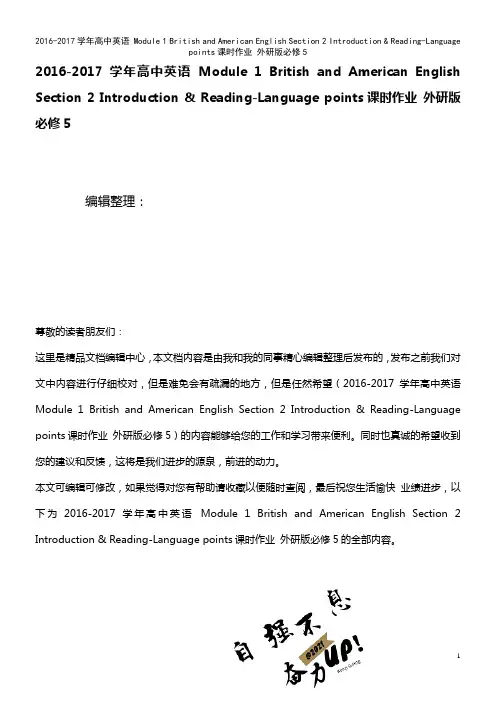
2016-2017学年高中英语Module 1 British and American English Section 2 Introduction & Reading-Language points课时作业外研版必修5编辑整理:尊敬的读者朋友们:这里是精品文档编辑中心,本文档内容是由我和我的同事精心编辑整理后发布的,发布之前我们对文中内容进行仔细校对,但是难免会有疏漏的地方,但是任然希望(2016-2017学年高中英语Module 1 British and American English Section 2 Introduction & Reading-Language points课时作业外研版必修5)的内容能够给您的工作和学习带来便利。
同时也真诚的希望收到您的建议和反馈,这将是我们进步的源泉,前进的动力。
本文可编辑可修改,如果觉得对您有帮助请收藏以便随时查阅,最后祝您生活愉快业绩进步,以下为2016-2017学年高中英语Module 1 British and American English Section 2 Introduction & Reading-Language points课时作业外研版必修5的全部内容。
Module 1 British and American EnglishSection 2 Introduction & Reading-Language points Ⅰ。
单句语法填空1.These stores have nearly as great a________(various) of goods as department stores,but the prices are lower.答案:variety2.Tom and David are both my good friends.David seems very serious,________Tom has a good sense of humor。
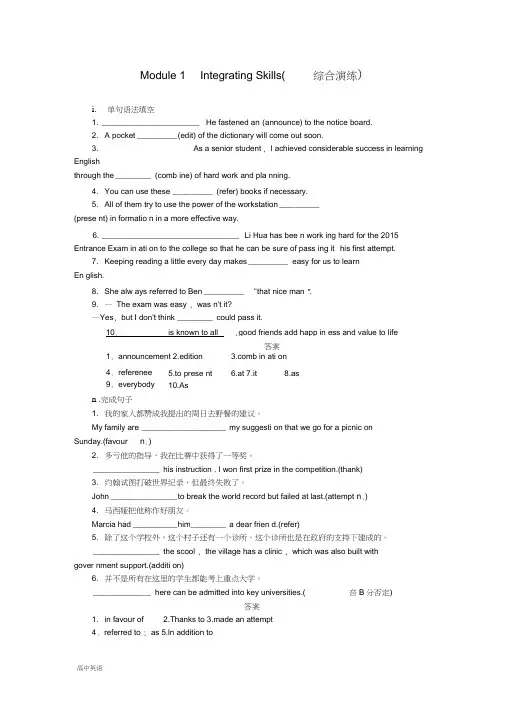
Module 1 Integrating Skills( 综合演练)i.单句语法填空1. ______________________ He fastened an (announce) to the notice board.2. A pocket _________ (edit) of the dictionary will come out soon.3. As a senior student , I achieved considerable success in learning Englishthrough the ________ (comb ine) of hard work and pla nning.4. You can use these _________ (refer) books if necessary.5. All of them try to use the power of the workstation _________(prese nt) in formatio n in a more effective way.6. _______________________________ Li Hua has bee n work ing hard for the 2015 Entrance Exam in ati on to the college so that he can be sure of pass ing it his first attempt.7. Keeping reading a little every day makes _________ easy for us to learnEn glish.8. She alw ays referred to Ben _________ “that nice man ".9. —The exam was easy , was n't it?—Yes, but I don't think ________ could pass it.10.is known to all ,good friends add happ in ess and value to life答案1. announcement2.editionb in ati on4. referenee5.to prese nt6.at7.it8.as9. everybody 10.Asn .完成句子1. 我的家人都赞成我提出的周日去野餐的建议。
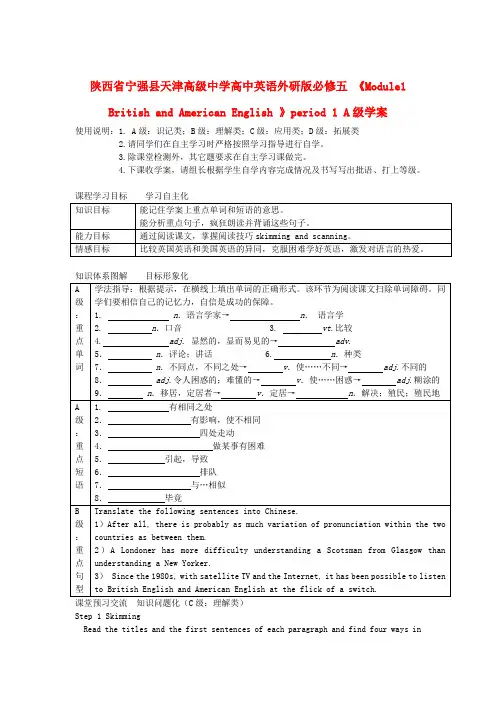
陕西省宁强县天津高级中学高中英语外研版必修五《Module1 British and American English 》period 1 A级学案使用说明:1. A级:识记类;B级:理解类;C级:应用类;D级:拓展类2.请同学们在自主学习时严格按照学习指导进行自学。
3.除课堂检测外,其它题要求在自主学习课做完。
4.下课收学案,请组长根据学生自学内容完成情况及书写写出批语、打上等级。
课程学习目标学习自主化课堂预习交流知识问题化(C级:理解类)Step 1 SkimmingRead the titles and the first sentences of each paragraph and find four ways inwhich British and American English are different.1) 2) 3) 4)Step 2 ScanningRead the first four paragraphs again and make notes of the differencesStep3 Choose the best answers.1) Why is it much easier for us to listen to British and American English nowadays?A. Thanks to the TV and InternetB. Because they are both popularC. Both A and BD. Not mentioned in the text.2) Why do many people believe that British English will disappear in the future?A. Because it is not easy to understand.B. Because its spelling is more difficultC. Because lots of American words and structures have passed into it.D. Because it is not as useful as American English.3) What will happen to English in the future?短文改错(共有十处错误,每处错误只涉及到一个词的删除,添加或修改)Music alwa ys has a special effect for people. You don’t have to know where it comes orwhat language it is,but still you can enjoy it. Of all the music, I like country music better. I like the comfortable feelings it gives me. It was on the radio that I first heard of it. Though I can’t remember the name of the song,but I remember that I was thinking the blue sky,the green land and the quiet life in the countryside then I was listening to it. From then on, I took great interests in country music and bought a lot of tapes. In my spare time,I like to play the tape and enjoying the music myself. My parents like it,too. They say the music always remind them of the good old days.。
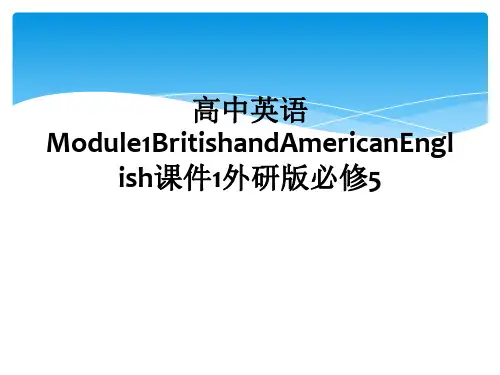
陕西省宁强县天津高级中学高二英语A级学生版学案:Module1 British and American English period 4 (外研版必修5)课堂预习交流知识问题化(C级:理解类)Step 1 根据课文内容,判断正误。
(True / False)1) In English the spelling of words always represents the sound.2) Noah Webster graduated from Cambridge University in 1778.3) By the 1850s, The Elementary Spelling Book had sold one million copies altogether.4) The letter s in the word island is silent.5) American Dictionary of the English Language is the No.1 dictionary for the world.6) Webster wanted to simplify the spelling of English and make it look different from British English.Step 2 Language points.1.present vt.赠送,颁发(礼物、奖品等),提交,陈述;呈现,出示n.礼物,赠品;现在adj.在场的,出席的;现在的归纳拓展at present=at the present time for the presentup to the present be present atpresent sb.with sth=present sth. to sb. 向某人赠送某物这家人把宝剑(sword)捐赠给了博物馆。
.=.present用作形容词,表示“在场的”时,通常作表语或后置定语;表示“现在的”时常用作前置定语。
陕西省宁强县天津高级中学2014届高三英语上学期第一次月考试题(含解析)新人教版第一部分英语知识运用(共四节,满分55分)第一节语音知识(共5小题;每小题1分,满分5分)从A、B、C、D四个选项中,找出其划线部分与所给单词的划线部分读音相同的选项。
【小题1】success A.official B.excuse C.correct D.exciting【小题2】society A.achieve B.friend C.science D.believe【小题3】theirs A.thread B.smooth C.thirsty D.health【小题4】raise A.remain B.certain C.mountain D.bargain【小题5】compare pany B.continue mon D.concert【答案】【小题1】D【小题2】C【小题3】B【小题4】A【小题5】B考点:考查单词辨音第二节情景对话(共5小题;每小题1分,满分5分)根据对话情景和内容,从对话后所给的选项中选出能填入每一空白处的最佳选项,并在答题卡上将该选项涂黑。
选项中有两个为多余选项。
(Jerry is at a hotel in Xi’an. He is talking to a clerk.)Clerk: What can I do for you, sir?Jerry: 6Clerk: At what time?Jerry: 7Clerk: We have a computer wake-up service. 8 That is to say, dial 2 and then 0615 for the time.Jerry: I see. Then it is 20615. Thank you. 9Clerk: Just dial your new wake-up time. The computer will record the new wake-up time.Jerry: If I dial 20700, I will be waken up at 7:00 a.m. Am I right ?Clerk: 10Jerry: Thank you. Good night.A. Yes, that’s right.B. 6:15 a.m., please.C. I’d like a room for two days.D. Please dial us for the service.E. Please dial 2 for the service first and then the time.F. By the way, if I want to change my wake –up time, what shall I do?G. I’m Jerry in room 528, and I want a wake-up call tomorrow morning.【答案】【小题1】G【小题2】B【小题3】E【小题4】F【小题5】A【小题5】根据上文:If I dial 20700, I will be waken up at 7:00 a.m. Am I right ?可知是说:是,对的,选A考点:考查情景交际第三节单项填空(共15小题;每小题1分,满分15分)从每题所给的A、B、C、D四个选项中,选出可以填入空白处的最佳选项。
第I卷(选择题)请点击修改第I卷的文字说明一、单项选择(题型注释)1.At present ,our school is calling on us to learn from _____LeiFeng and to be ____living LeiFeng.A. a , aB. /;aC. / ; /D. the ; /【答案】B【解析】试题分析:句意:现在我们学校在号召我们向雷锋学习做一个活雷锋。
第一空是人名前面,不加冠词,第二空填a,泛指“一个活雷锋”,所以选B.考点:考查冠词2.I hurried to the booking-office only _______ that all the tickets ______ out.A. to tell ; soldB. to be told ; had been soldC. telling; had been soldD. told ; was sold【答案】B【解析】试题分析:句意:我匆忙来到售票厅只是被告诉所有的票都被卖完了。
第一空用不定式做结果状语,表示意料之外的结果,而且是不定式的被动,第二空用过去完成时的被动,因为在我到售票厅的时候,票已经被卖完了,所以选B。
考点:考查不定式和时态语态3.------ This is such an interesting book ______ everyone likes to read .------Yes , but there are few such books _______ in the bookstore now .A. that ;presentB. as ;convenientC. as , availableD. that ; available 【答案】C【解析】试题分析:---这本书如此有趣,每个人都喜欢读。
---是的名单上现在书店很少能买到这样的书了。
第一空填as,引导定语从句,修饰先行词such an interesting book,在定语从句中as做宾语,第二空填available“可获得的,可买到的”,present“在场的”,convenient“方便的”,所以选C。
陕西省宁强县天津高级中学高二英语C 教师版学案:Module1 British and American English period 2 (外研版必修5)使用说明:1.请各位同学在自主学习时认真研读学习目标和学法指导,严格按照学法指导进行自学。
(同学们,字如其人,请注意你的书写)2. A级:识记类;B级:理解类;C级:应用类;D级:拓展类3.下课收学案,组长根据组员自学完成情况,写出批语、打上等级。
课程学习目标学习自主化学习目标掌握重点单词,短语和重难点探究部分重点句式。
能力目标通过做练习,能够在语境中正确运用所学单词和短语。
重点难点探究技能系统化独学:★仔细研读所给解析,理解每个语言点的用法★根据自己的理解和相应的提示,完成相应习题★做完题之后,用红笔标注出存在问题的题目。
群学:★通过小组讨论解决独学中存在的问题★课堂上踊跃展示。
Don’t be shy! Be well-prepared and show yourself bravely! 今天你展示了吗? (C 级)1.have...in common(with)(和……)在……方面有相同之处归纳拓展have a lot (much)/something/little/nothing in common with 与……有很多/有一些/几乎没有/没有相同之处in common(with)(与……)相同,一样我们彼此间有很多相同之处,因此我们成了好朋友。
We have a lot in common with each other,so we became/have become good friends. 和她的妹妹一样,艾米(Amy)非常喜欢唱歌。
In common with her sister,Amy likes singing very much.合作探究:请说明common,usual,normal与ordinary之间的用法区别。
(1)common普通的,随时会发生或随时可见的,共同的。
(2)usual惯常的,通常的,符合习惯的。
(3)normal符合标准的,正常的。
(4)ordinary普通的,一般的,不特殊的(与“special”相反)。
2.make a difference (to sb./sth.)(对某人/某事物)有作用或影响;(对某人/某事物)重要、要紧归纳拓展make no/little difference (to sb./sth.)(对某人/某事物)没有/几乎没有作用或影响;(对某人/某事物)不重要、不要紧make some difference (to sb./sth.)(对某人/某事物)有些作用或影响make much difference to对……有很大影响(作用)例句:I don't think what he said will make any difference.我认为他说的话不会起什么作用。
It makes no difference whether you will come or not.你来不来没什么区别。
你是否能按时完成它对我们有很大的影响。
It makes much difference to us whether you can finish it on time.完成句子(1)It __________________ whether he will help us or not.(他帮不帮助我们没有多大的影响。
)(2)If you want to __________________,you should work hard.(如果你想与别人不一样,你就应该努力工作。
)(3)Does his failure __________________?(他的失败对你有影响吗?)答案:(1)makes no difference(2)make a difference(3)make any difference to you3.get around 四处走动;旅行;(新闻或消息)传开【典型例句】She gets around with the help of a stick.她拄着拐杖四处走动。
His work makes it possible for him to get around in different countries.他的工作使他能在不同的国家旅行。
他要走的消息很快传播开了。
News soon got around that he was leaving.【相关链接】get引导的其他常用的短语:get across使了解;使明白 get down下降;泄气;压抑;记下get along相处融洽;进展 get down下降;泄气;压抑;记下get away脱身;离开,走开 get over 克服4.confusing adj.令人困惑的;难懂的归纳拓展(1)confuse vt.使迷惑;使难于理解confused adj.感到迷惑的,感到难懂的confusion n.困惑,混乱;混淆(2)confuse A with/and B 把A和B相混淆be confused by sth.被……搞糊涂了get/become confused困惑,不知所措in confusion困惑地;困窘地例句:What he said was confusing,so I was confused at his words.他说的话很难懂,所以我对他说的话感到迷惑不解。
Don't confuse him with his brother.They are much alike.别把他与他的弟弟混淆了,他们非常相像。
He stood there in confusion.他困窘地站在那里。
用confuse的适当形式填空We can conclude his confused look suggests that he gets confused by this confusing question.pare v.比较;对比;与……类似n. 比较;对比We carefully compared the first report and the second one.我们仔细比较了第一份报告和第二份报告。
This house does not compare with our previous one.这房子比不上我们以前的。
The lady has a diamond beyond compare.这位女士有一颗独一无二的钻石。
Compared with that book,this one is much better.跟那本书相比,这本好多了。
【知识小结】compare 作动词是表示“比较;对比”或“与……类似”,常用在compare A with B 或 compare A and B的结构中;也可以用作名词。
【相关链接】comparison n.比较;对比comparative adj.比较的;相对的comparatively adv.相对地填空用compare的适当形式填空。
(1)It is difficult to make a _________ between this book and that one.(2)My problem seemed nothing _________ with other people’s.答案:(1)comparison (2)compared(3)_________ with the size of the whole earth,the biggest ocean does not seembig at all.pareB.When comparedparingD.When comparing答案:B(4)_________ with his bike,this one is more expensive.pared withparing withC.To compare withpare with 答案:A6.differ v.不同;相异differ with/from sb./on/about/over sth.关于某事与某人意见不同different adj.不一样的;有区别的difference n.不同;差别;差异同义句转换:British English and American English differ in many ways.=British English differs from American English in many ways.=British English is different from American English in many ways.=There are differences between British English and American English in many ways.英国英语和美国英语在很多方面有区别。
I’m sorry to differ with you on/about/over that.对不起,在那一点儿上我与你看法不同。
7.表示“做某事有困难”可以用下列几种结构:have difficulty (in) doing sth.have difficulty with sth.there is (some) difficulty (in) doing sth.例句:They have no difficulty (in) talking with each other in English. 他们之间用英语交谈没有丝毫困难。
There is no difficulty for you in being admitted into a teachers’ colle ge.对你来讲,被一所师范院校录取没什么困难。
You can hardly imagine what difficulty I had______Alice to give up the foolish idea.A.persuaded B.to persuadeC.persuade D.persuading【答案】 D8.lead to 导致,引起;通向lead sb.to+n.带领某人到某地lead sb.to do sth.导致某人做某事lead a...life过着……的生活His carelessness led to his failing the exam.他的粗心致使他考试不及格。
我们的英语老师用一种奇特的方法促使我们很活跃地学习英语。